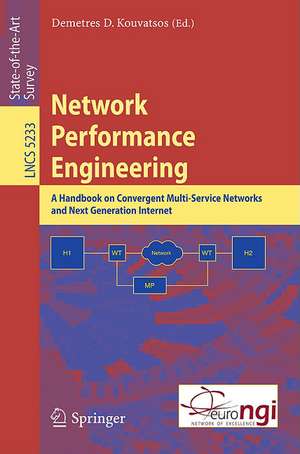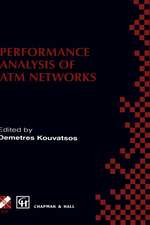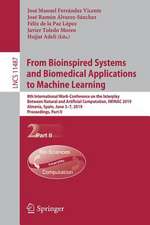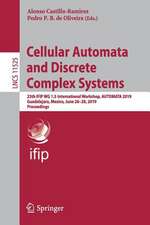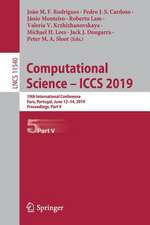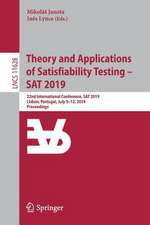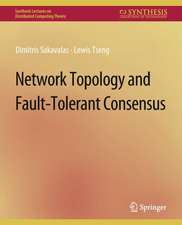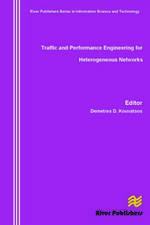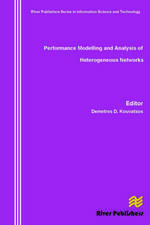Network Performance Engineering: A Handbook on Convergent Multi-Service Networks and Next Generation Internet: Lecture Notes in Computer Science, cartea 5233
Editat de Demetres D. Kouvatsosen Limba Engleză Paperback – 9 mai 2011
Din seria Lecture Notes in Computer Science
- 20%
 Preț: 1061.55 lei
Preț: 1061.55 lei - 20%
 Preț: 307.71 lei
Preț: 307.71 lei - 20%
 Preț: 438.69 lei
Preț: 438.69 lei - 20%
 Preț: 645.28 lei
Preț: 645.28 lei -
 Preț: 410.88 lei
Preț: 410.88 lei - 15%
 Preț: 580.46 lei
Preț: 580.46 lei - 17%
 Preț: 427.22 lei
Preț: 427.22 lei - 20%
 Preț: 596.46 lei
Preț: 596.46 lei -
 Preț: 449.57 lei
Preț: 449.57 lei - 20%
 Preț: 353.50 lei
Preț: 353.50 lei - 20%
 Preț: 1414.79 lei
Preț: 1414.79 lei - 20%
 Preț: 309.90 lei
Preț: 309.90 lei - 20%
 Preț: 583.40 lei
Preț: 583.40 lei - 20%
 Preț: 1075.26 lei
Preț: 1075.26 lei - 20%
 Preț: 310.26 lei
Preț: 310.26 lei - 20%
 Preț: 655.02 lei
Preț: 655.02 lei - 20%
 Preț: 580.93 lei
Preț: 580.93 lei - 20%
 Preț: 340.32 lei
Preț: 340.32 lei - 18%
 Preț: 938.83 lei
Preț: 938.83 lei - 20%
 Preț: 591.51 lei
Preț: 591.51 lei - 15%
 Preț: 438.59 lei
Preț: 438.59 lei - 20%
 Preț: 337.00 lei
Preț: 337.00 lei -
 Preț: 389.48 lei
Preț: 389.48 lei - 20%
 Preț: 607.39 lei
Preț: 607.39 lei - 20%
 Preț: 1024.44 lei
Preț: 1024.44 lei - 20%
 Preț: 579.30 lei
Preț: 579.30 lei - 20%
 Preț: 763.23 lei
Preț: 763.23 lei - 20%
 Preț: 453.32 lei
Preț: 453.32 lei - 20%
 Preț: 575.48 lei
Preț: 575.48 lei - 20%
 Preț: 585.88 lei
Preț: 585.88 lei - 20%
 Preț: 825.93 lei
Preț: 825.93 lei - 20%
 Preț: 763.23 lei
Preț: 763.23 lei - 17%
 Preț: 360.19 lei
Preț: 360.19 lei - 20%
 Preț: 1183.14 lei
Preț: 1183.14 lei - 20%
 Preț: 340.32 lei
Preț: 340.32 lei - 20%
 Preț: 504.57 lei
Preț: 504.57 lei - 20%
 Preț: 369.12 lei
Preț: 369.12 lei - 20%
 Preț: 583.40 lei
Preț: 583.40 lei - 20%
 Preț: 343.62 lei
Preț: 343.62 lei - 20%
 Preț: 350.21 lei
Preț: 350.21 lei - 20%
 Preț: 764.89 lei
Preț: 764.89 lei - 20%
 Preț: 583.40 lei
Preț: 583.40 lei - 20%
 Preț: 649.49 lei
Preț: 649.49 lei - 20%
 Preț: 341.95 lei
Preț: 341.95 lei - 20%
 Preț: 238.01 lei
Preț: 238.01 lei - 20%
 Preț: 538.29 lei
Preț: 538.29 lei
Preț: 1074.24 lei
Preț vechi: 1342.80 lei
-20% Nou
Puncte Express: 1611
Preț estimativ în valută:
205.55€ • 215.19$ • 170.08£
205.55€ • 215.19$ • 170.08£
Carte disponibilă
Livrare economică 15-29 martie
Preluare comenzi: 021 569.72.76
Specificații
ISBN-13: 9783642027413
ISBN-10: 3642027415
Pagini: 800
Ilustrații: XVIII, 1080 p. 342 illus., 88 illus. in color.
Dimensiuni: 155 x 235 x 43 mm
Greutate: 1.41 kg
Ediția:2011
Editura: Springer Berlin, Heidelberg
Colecția Springer
Seriile Lecture Notes in Computer Science, Computer Communication Networks and Telecommunications
Locul publicării:Berlin, Heidelberg, Germany
ISBN-10: 3642027415
Pagini: 800
Ilustrații: XVIII, 1080 p. 342 illus., 88 illus. in color.
Dimensiuni: 155 x 235 x 43 mm
Greutate: 1.41 kg
Ediția:2011
Editura: Springer Berlin, Heidelberg
Colecția Springer
Seriile Lecture Notes in Computer Science, Computer Communication Networks and Telecommunications
Locul publicării:Berlin, Heidelberg, Germany
Public țintă
ResearchCuprins
Measurement Techniques: On Kleinrock’s Independence.- Application Level .- Measurements and Analysis of Application-Perceived Throughput via Mobile Links.- Traffic Modelling and Engineering: Statistical Analysis and Modeling of Peer-to-Peer Multimedia.- Markovian Modelling of Internet Traffic.- Multi-timescale Economics-Driven Traffic Management in MPLS Networks.- Modelling LRD and SRD Traffic with the Batch Renewal Process:
Review of Results and Open Issues.- Local Area Networks and Self-similar Traffic.- Characterisation of Internet Traffic in Wireless Networks.- Queueing Systems and Networks: Performance Analysis of Priority Queueing Systems in Discrete Time.- Queueing Networks with Blocking: Analysis, Solution Algorithms and Properties.- Switching Queueing Networks.- Principles of Fairness Quantification in Queueing Systems.- Analytic Methodologies: Large Deviations Theory: Basic Principles and Applications to Communication Networks.- Analysis of Non-product Form Parallel Queues Using Markovian Process Algebra.- Product-Form Solution in PEPA via the Reversed Process.- Generalised Entropy Maximisation and Queues with Bursty and/or Heavy Tails.- Stochastic Ordering of Semi-Markov Processes.- Spectral Expansion Solutions for Markov-Modulated.- Diffusion Approximation as a Modelling Tool.- Simulation Techniques: Cross Layer Simulation: Application to Performance Modelling of Networks Composed of MANETs and Satellites.- The Rare Event Simulation Method RESTART: Efficiency Analysis and Guidelines for Its Application.-Performance Evaluation Studies:An Algebraic Multigrid Solution ofLarge Hierarchical Markovian Models Arising in Web Information Retrieval.- An Introduction to Modelling and Performance Evaluation for TCP Networks.- Performance Modelling and Evaluation of a Mobility Management Mechanism in IMS-Based Networks.- Generalized QBD Processes, Spectral Expansion and Performance Modeling Applications.- Some New Markovian Models for Traffic and Performance Evaluation of Telecommunication Networks.- Modelling and Analysis of a Dynamic Guard Channel Handover Scheme with Heterogeneous Call Arrival Processes.- On the Performance Modelling and Optimisation of DOCSIS HFC Networks.- Mobile, Wireless and Ad Hoc Networks: Mobility Models for Mobility Management.- Wireless Ad Hoc Networks: An Overview.- Broadcasting Methods in MANETS: An Overview.- ROMA: A Middleware Framework for Seamless Handover.-Seamless Roaming: Developments and Challenges .- Optical Networks: Optical Metropolitan Networks: Packet Format, MAC Protocols and Quality of Service.- Performance of Multicast Packet Aggregation in All Optical Slotted Networks.- Performance Modelling and Traffic Characterisation of Optical Networks.- QoS Metrics and Algorithms: The Search for QoS in Data Networks: A Statistical Approach .- Transform-Domain Analysis of Packet Delay in Network Nodes with
QoS-Aware Scheduling.- All IP Convergence and Networking: IP Networking and Future Evolution,. Content Distribution over IP: Developments and Challenges Network Management and Services: Implementation and Evaluation of Network Intrusion Detection Systems.- Overlay Networks: Unicast QoS Routing in Overlay Networks.- Overlay Networks and Graph Theoretic Concepts
Review of Results and Open Issues.- Local Area Networks and Self-similar Traffic.- Characterisation of Internet Traffic in Wireless Networks.- Queueing Systems and Networks: Performance Analysis of Priority Queueing Systems in Discrete Time.- Queueing Networks with Blocking: Analysis, Solution Algorithms and Properties.- Switching Queueing Networks.- Principles of Fairness Quantification in Queueing Systems.- Analytic Methodologies: Large Deviations Theory: Basic Principles and Applications to Communication Networks.- Analysis of Non-product Form Parallel Queues Using Markovian Process Algebra.- Product-Form Solution in PEPA via the Reversed Process.- Generalised Entropy Maximisation and Queues with Bursty and/or Heavy Tails.- Stochastic Ordering of Semi-Markov Processes.- Spectral Expansion Solutions for Markov-Modulated.- Diffusion Approximation as a Modelling Tool.- Simulation Techniques: Cross Layer Simulation: Application to Performance Modelling of Networks Composed of MANETs and Satellites.- The Rare Event Simulation Method RESTART: Efficiency Analysis and Guidelines for Its Application.-Performance Evaluation Studies:An Algebraic Multigrid Solution ofLarge Hierarchical Markovian Models Arising in Web Information Retrieval.- An Introduction to Modelling and Performance Evaluation for TCP Networks.- Performance Modelling and Evaluation of a Mobility Management Mechanism in IMS-Based Networks.- Generalized QBD Processes, Spectral Expansion and Performance Modeling Applications.- Some New Markovian Models for Traffic and Performance Evaluation of Telecommunication Networks.- Modelling and Analysis of a Dynamic Guard Channel Handover Scheme with Heterogeneous Call Arrival Processes.- On the Performance Modelling and Optimisation of DOCSIS HFC Networks.- Mobile, Wireless and Ad Hoc Networks: Mobility Models for Mobility Management.- Wireless Ad Hoc Networks: An Overview.- Broadcasting Methods in MANETS: An Overview.- ROMA: A Middleware Framework for Seamless Handover.-Seamless Roaming: Developments and Challenges .- Optical Networks: Optical Metropolitan Networks: Packet Format, MAC Protocols and Quality of Service.- Performance of Multicast Packet Aggregation in All Optical Slotted Networks.- Performance Modelling and Traffic Characterisation of Optical Networks.- QoS Metrics and Algorithms: The Search for QoS in Data Networks: A Statistical Approach .- Transform-Domain Analysis of Packet Delay in Network Nodes with
QoS-Aware Scheduling.- All IP Convergence and Networking: IP Networking and Future Evolution,. Content Distribution over IP: Developments and Challenges Network Management and Services: Implementation and Evaluation of Network Intrusion Detection Systems.- Overlay Networks: Unicast QoS Routing in Overlay Networks.- Overlay Networks and Graph Theoretic Concepts
Notă biografică
During recent years a great deal of progress has been made in performance modelling and evaluation of the Internet, towards the convergence of multi-service networks of diverging technologies, supported by internetworking and the evolution of diverse access and switching technologies.
The 44 chapters presented in this handbook are revised invited works drawn from PhD courses held at recent HETNETs International Working Conferences on Performance Modelling and Evaluation of Heterogeneous Networks. They constitute essential introductory material preparing the reader for further research and development in the field of performance modelling, analysis and engineering of heterogeneous networks and of next and future generation Internets. The handbook aims to unify relevant material already known but dispersed in the literature, introduce the readers to unfamiliar and unexposed research areas and, generally, illustrate the diversity of research found in the high growth field of convergent heterogeneous networks and the Internet.
The chapters are broadly classified into 12 parts covering the following topics: Measurement Techniques, Traffic Modelling and Engineering, Queueing Systems and Networks, Analytic Methodologies, Simulation Techniques, Performance Evaluation Studies, Mobile, Wireless and Ad Hoc Networks, Optical Networks, QoS Metrics and Algorithms, All IP Convergence and Networking, Network Management and Services, and Overlay Networks.
The 44 chapters presented in this handbook are revised invited works drawn from PhD courses held at recent HETNETs International WorkingConferences on Performance Modelling and Evaluation of Heterogeneous Networks. They constitute essential introductory material preparing the reader for further research and development in the field of performance modelling, analysis and engineering of heterogeneous networks and of next and future generation Internets. The handbook aims to unify relevant material already known but dispersed in the literature, introduce the readers to unfamiliar and unexposed research areas and, generally, illustrate the diversity of research found in the high growth field of convergent heterogeneous networks and the Internet.
The chapters are broadly classified into 12 parts covering the following topics: Measurement Techniques, Traffic Modelling and Engineering, Queueing Systems and Networks, Analytic Methodologies, Simulation Techniques, Performance Evaluation Studies, Mobile, Wireless and Ad Hoc Networks, Optical Networks, QoS Metrics and Algorithms, All IP Convergence and Networking, Network Management and Services, and Overlay Networks.
The chapters are broadly classified into 12 parts covering the following topics: Measurement Techniques, Traffic Modelling and Engineering, Queueing Systems and Networks, Analytic Methodologies, Simulation Techniques, Performance Evaluation Studies, Mobile, Wireless and Ad Hoc Networks, Optical Networks, QoS Metrics and Algorithms, All IP Convergence and Networking, Network Management and Services, and Overlay Networks.
The 44 chapters presented in this handbook are revised invited works drawn from PhD courses held at recent HETNETs International Working Conferences on Performance Modelling and Evaluation of Heterogeneous Networks. They constitute essential introductory material preparing the reader for further research and development in the field of performance modelling, analysis and engineering of heterogeneous networks and of next and future generation Internets. The handbook aims to unify relevant material already known but dispersed in the literature, introduce the readers to unfamiliar and unexposed research areas and, generally, illustrate the diversity of research found in the high growth field of convergent heterogeneous networks and the Internet.
The chapters are broadly classified into 12 parts covering the following topics: Measurement Techniques, Traffic Modelling and Engineering, Queueing Systems and Networks, Analytic Methodologies, Simulation Techniques, Performance Evaluation Studies, Mobile, Wireless and Ad Hoc Networks, Optical Networks, QoS Metrics and Algorithms, All IP Convergence and Networking, Network Management and Services, and Overlay Networks.
The 44 chapters presented in this handbook are revised invited works drawn from PhD courses held at recent HETNETs International WorkingConferences on Performance Modelling and Evaluation of Heterogeneous Networks. They constitute essential introductory material preparing the reader for further research and development in the field of performance modelling, analysis and engineering of heterogeneous networks and of next and future generation Internets. The handbook aims to unify relevant material already known but dispersed in the literature, introduce the readers to unfamiliar and unexposed research areas and, generally, illustrate the diversity of research found in the high growth field of convergent heterogeneous networks and the Internet.
The chapters are broadly classified into 12 parts covering the following topics: Measurement Techniques, Traffic Modelling and Engineering, Queueing Systems and Networks, Analytic Methodologies, Simulation Techniques, Performance Evaluation Studies, Mobile, Wireless and Ad Hoc Networks, Optical Networks, QoS Metrics and Algorithms, All IP Convergence and Networking, Network Management and Services, and Overlay Networks.
The chapters are broadly classified into 12 parts covering the following topics: Measurement Techniques, Traffic Modelling and Engineering, Queueing Systems and Networks, Analytic Methodologies, Simulation Techniques, Performance Evaluation Studies, Mobile, Wireless and Ad Hoc Networks, Optical Networks, QoS Metrics and Algorithms, All IP Convergence and Networking, Network Management and Services, and Overlay Networks.
Caracteristici
A handbook on convergent multi-service networks and next generation internet State-of-the-Art-Survey Invited works drawn from PhD courses held at recent HETNETs International Working Conferences on Performance Modelling and Evaluation of Heterogeneous Networks
